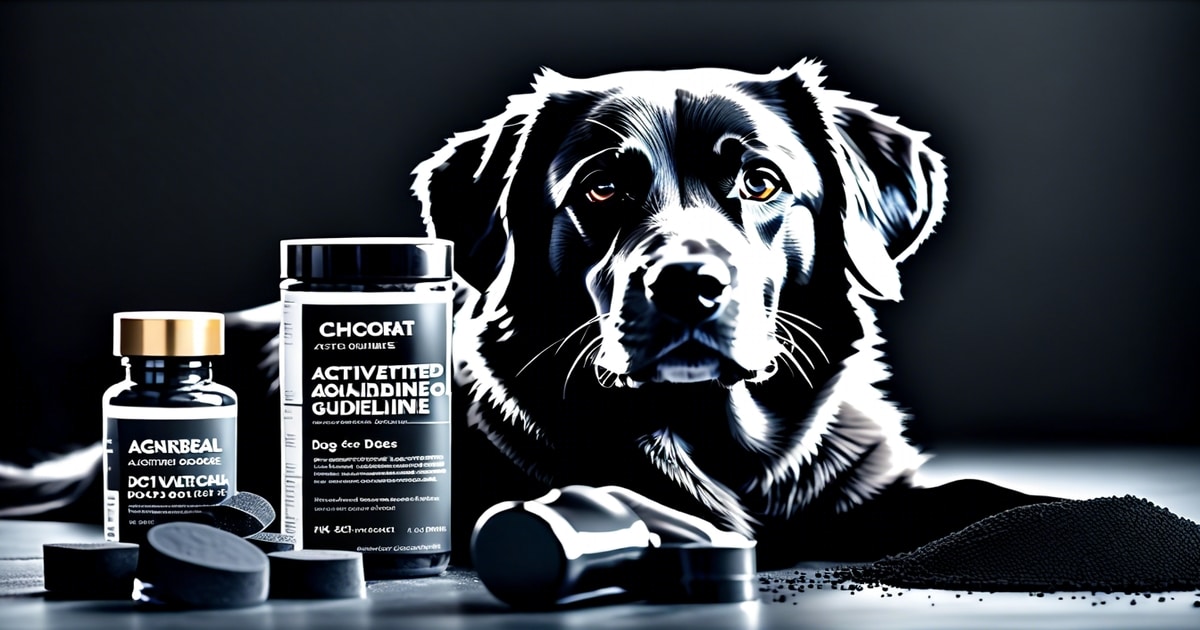Key Takeaways
-
Consider Activated Charcoal: It can benefit your dog in certain situations like toxin ingestion or poisoning.
-
Consult a Veterinarian: Before administering activated charcoal to your dog or cat, seek professional advice for proper dosage and usage.
-
Monitor Your Dog: Monitor your dog after giving activated charcoal for any side effects or adverse reactions to poisons.
-
Explore Alternatives: If activated charcoal is unsuitable for your dog, discuss alternative treatment options with your vet.
-
Stay Informed: Understand the proper dosing, doses, and toxicity guidelines associated with activated charcoal to ensure your dog’s well-being.
-
Act Promptly: If you suspect your dog has ingested a harmful substance or toxin, contact your vet immediately for guidance.
Have you ever wondered how activated charcoal can benefit your furry friends, cats? Curious about the wonders it can do for your dog’s health and well-being? Dive into this post to uncover the secrets of using activated charcoal for dogs. From detoxifying properties to aiding digestion, this natural remedy has much to offer our canine companions. Discover the ins and outs of incorporating activated charcoal into your dog’s routine and see its positive impact on their overall health.
Understanding Activated Charcoal
Benefits of Using Activated Charcoal
Activated charcoal can help absorb toxins in a dog’s system, aiding in cases of poisoning or ingestion of harmful substances. It can also benefit dogs with digestive issues like excessive gas or diarrhea.
When administered correctly, activated charcoal can effectively neutralize toxins before they are absorbed into the bloodstream. This is particularly useful in emergencies such as accidental ingestion of medications, toxic foods, or chemicals.
-
Can absorb toxins and harmful substances
-
Effective in neutralizing toxins quickly
Administration and Dosage Guidelines
It is crucial to consult a veterinarian before giving your dog activated charcoal. The dosage varies based on the size and weight of the dog and should only be given under professional guidance.
Here are some general guidelines to keep in mind when using activated charcoal for dogs:
-
Always follow your vet’s instructions.
-
Administer the correct dosage based on your dog’s weight.
-
Mix the activated charcoal powder with water to form a paste before giving it to your dog.
-
Consult vet for proper dosage.
-
Mix powder with water before administering
Why Use Activated Charcoal for Dogs
Benefits of Activated Charcoal
Activated charcoal can benefit dogs as it helps absorb toxins in their bodies. It is commonly used to treat poisoning or overdose cases. When ingested, activated charcoal binds to the toxic substances in the stomach, preventing them from being absorbed into the bloodstream.
-
Absorbs toxins
-
Treats poisoning and overdoses
Activated charcoal is also useful in gastrointestinal issues like bloating, where it can help reduce gas and bloating discomfort by absorbing excess gases. Moreover, it aids in treating diarrhea by binding to harmful substances in the digestive system.
-
Reduces gas and bloating
-
Treats diarrhea
Administration of Activated Charcoal
When using activated charcoal for dogs, following proper administration guidelines is crucial. The most common form is a powder that needs to be mixed with water before giving it orally to your dog. The dosage varies based on your dog’s weight and the severity of the situation.
-
Mix powder with water.
-
Administer orally.
-
Follow the correct dosage based on weight.
In emergencies like poisoning, please contact a veterinarian immediately before administering activated charcoal to ensure appropriate treatment for your furry friend.
Common Uses in Veterinary Practices

Treatment of Poisoning
Activated charcoal for dogs is commonly used in veterinary practices to treat poisoning. It binds toxins in the gastrointestinal tract, preventing their absorption into the bloodstream.
-
Effectively treats various types of poisoning
-
Quick and efficient way to prevent toxin absorption
Relief from Gastrointestinal Issues
Veterinarians often recommend activated charcoal for dogs with gastrointestinal issues. This includes symptoms like diarrhea, gas, or bloating.
-
Alleviates discomfort caused by digestive problems
-
Helps regulate digestion and reduce flatulence
How It Works in a Dog’s System
Absorption Process
Activated charcoal for dogs works by binding toxins through an absorption process. When ingested, it attracts and traps harmful substances in the gastrointestinal tract. This prevents the toxins from being absorbed into the bloodstream.
Activated charcoal has a large surface area that binds to chemicals like pesticides, medications, or other toxic substances in a dog’s stomach. By trapping these toxins, activated charcoal helps prevent them from causing harm within the body.
Administration Methods
-
Administered orally: Usually given as a powder mixed with water or food.
-
Through stomach pumping: In severe cases where immediate toxin removal is necessary.
When used properly, activated charcoal for dogs can effectively treat poisoning incidents by preventing further absorption of harmful substances into the body. However, it should always be administered under veterinary supervision to ensure proper dosage and effectiveness.
Dosage Guidelines for Dogs

Proper Dosage Administration
When giving activated charcoal to dogs, it’s crucial to administer the correct dosage. The general recommendation is 1 gram of activated charcoal per kilogram of body weight. For example, if your dog weighs 10 kilograms, you would give them 10 grams of activated charcoal.
It’s essential to consult your veterinarian before administering any activated charcoal to your dog. They can guide the appropriate dosage based on your dog’s health needs and conditions.
Frequency and Timing
The frequency at which you can give activated charcoal to your dog depends on various factors, including the reason for administration and their overall health condition. It should be given up to a few times a day unless directed by a veterinarian.
Remember that activated charcoal may interfere with the absorption of certain medications or nutrients in the stomach. Therefore, waiting at least two hours before or after giving other medications or food when administering activated charcoal is recommended to ensure its effectiveness.
Safety Measures and Side Effects
Introduce Gradual Introduction
Start with small amounts when introducing activated charcoal to dogs to avoid gastrointestinal issues. Begin with a quarter of the recommended dose.
Start by gradually mixing it into your dog’s food or water, ensuring they tolerate it well before increasing the amount.
Monitor for Adverse Reactions
Observe your dog closely after administering activated charcoal. Look out for any signs of stomach upset, like vomiting or diarrhea.
Stop giving them the charcoal immediately, and consult your veterinarian if you notice any adverse reactions.
Alternatives to Activated Charcoal
Natural Remedies
If you’re looking for natural remedies to help your furry friend in case of poisoning, consider options like pumpkin. Pumpkin can aid in soothing digestive issues and absorbing toxins due to its high fiber content.
Consider using baking soda as an alternative. Baking soda can help neutralize toxins and reduce stomach acid levels, relieving certain poisonings.
-
Pumpkin
-
Baking soda
Over-the-Counter Products
There are over-the-counter products available that can serve as alternatives to activated charcoal. For instance, some pet stores offer specific products made for detoxifying pets after ingestion of toxic substances.
You may also opt for commercially prepared solutions, such as liquid anti-toxin formulas for pets. These products are convenient and effective in treating various types of poisoning.
-
Pet store detox products
-
Liquid anti-toxin formulas
Case Studies and Success Stories
Effectiveness in Treating Poisoning
Activated charcoal for dogs has shown remarkable effectiveness in treating poisoning cases. Ingestion of toxic substances like chocolate, medications, or household chemicals can be life-threatening to dogs. Activated charcoal works by binding to the toxins in the stomach before they can be absorbed into the bloodstream.
-
Rapidly absorbs toxins
-
Prevents further harm from ingestion
In one case study, a dog ingested a significant amount of dark chocolate. The quick administration of activated charcoal at the vet’s office helped prevent severe toxicity symptoms from developing.
Quick Recovery After Ingestion
Dogs that ingest harmful substances often recover rapidly after receiving activated charcoal treatment. This quick recovery is attributed to the ability of activated charcoal to reduce toxin absorption and minimize its effects on the body.
-
Minimizes toxin absorption
-
Reduces the severity of symptoms
For instance, a dog that accidentally consumed rat poison was given activated charcoal promptly upon arrival at the veterinary clinic. The dog showed improvement within hours and was discharged without any long-term complications.
Summary
You’ve learned about the benefits of using activated charcoal for dogs, from its ability to absorb toxins to its versatile applications in veterinary care. Understanding how it works in your dog’s system and the correct dosage guidelines can help you utilize this natural remedy effectively and safely. Remember to consider safety measures and potential side effects and explore alternative options when necessary. Real-life case studies and success stories further highlight the positive impact of activated charcoal in enhancing your furry friend’s well-being.
Now that you’re equipped with this knowledge, why not discuss with your veterinarian if activated charcoal could benefit your dog in specific situations? Your proactive approach to exploring natural remedies like activated charcoal can contribute to your pet’s overall health and happiness. Keep learning, and keep caring for your four-legged companion!
Frequently Asked Questions
Is activated charcoal safe for dogs?
Activated charcoal is generally safe for dogs when used under veterinary guidance. It can help in certain poisoning cases by binding toxins in the stomach before they are absorbed into the bloodstream.
How does activated charcoal work in a dog’s system?
Activated charcoal works by adsorption, not absorption. It binds to toxins and chemicals in the gastrointestinal tract, preventing their absorption into the bloodstream. This helps reduce toxicity levels and can be beneficial in cases of ingestion of harmful substances.
Can I give any activated charcoal to my dog?
No, only use activated charcoal specifically formulated for veterinary use on dogs. Avoid giving human-grade products as they may contain additives or ingredients that could harm your pet.
Are there any side effects associated with using activated charcoal for dogs?
While rare, some potential side effects of using activated charcoal in dogs include vomiting or constipation. It’s crucial to follow dosage guidelines provided by a veterinarian and monitor your dog closely after administration.
How do I determine the correct dosage of activated charcoal for my dog?
Dosage guidelines for activated charcoal depend on your dog’s weight and ingested substance. Always consult a veterinarian before administering any amount of activated charcoal to ensure you give the appropriate dose based on your dog’s specific situation.

